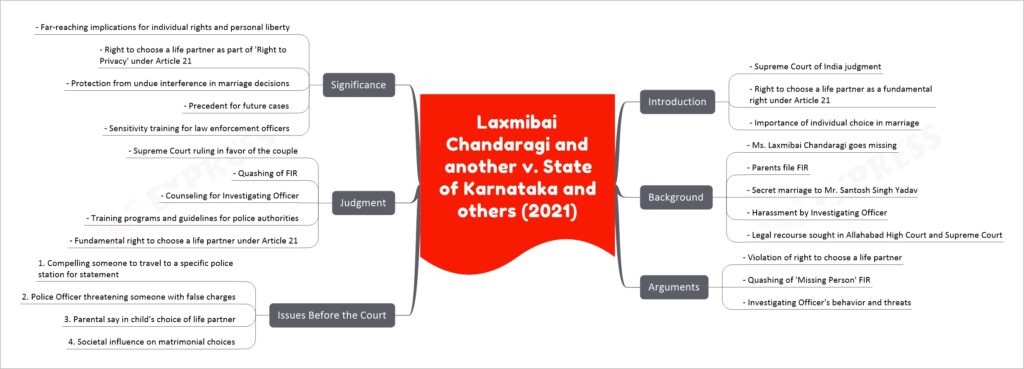Laxmibai Chandaragi and another v. State of Karnataka and others (2021) – Upholding Personal Liberty
In the Laxmibai Chandaragi B v. State of Karnataka and others case, the Supreme Court of India made a groundbreaking judgment that upheld the right to choose a life partner as a fundamental right under Article 21 of the Constitution. The court emphasized that parental consent, societal norms, or caste considerations should not dictate an individual’s choice in marriage. This article delves into the background of the case, arguments presented, issues before the court, the judgment, and its significance.
Background:
Ms. Laxmibai Chandaragi, a young woman, went missing on 14 October 2020. Her parents filed an FIR (First Information Report) on her behalf. Upon investigation, it was discovered that she had secretly traveled from Hubli to Delhi and married Mr. Santosh Singh Yadav without her parents’ knowledge or consent. The couple was harassed by the investigating officer (IO), who insisted they return to Karnataka to record their statements, despite the woman’s fear of threats to her life from her parents. The couple sought legal recourse in the Allahabad High Court, and later the Supreme Court of India.
Arguments:
The couple argued that their right to choose a life partner was violated, and they sought the quashing of the ‘Missing Person’ FIR. They also raised concerns about the behavior of the Investigating Officer, who threatened them with false charges and coerced them to return to Karnataka.
Issues Before the Court:
- Can the Investigating Officer compel someone to travel to a specific police station to record a statement?
- Can a Police Officer threaten someone with false charges if they fail to comply with the officer’s dictates?
- Do parents have a say in their child’s right to choose a life partner who has attained the legal age for marriage?
- Can society exert influence over the matrimonial choices of any person?
Judgment:
The Supreme Court ruled in favor of the couple. The court quashed the FIR filed by the parents and ordered the counseling of the IO. It directed police authorities to devise training programs and guidelines for handling socially sensitive cases within eight weeks. The court held that the right to choose a life partner is a fundamental right under Article 21 and should be given primacy over parental consent, societal norms, and caste considerations.
Significance:
This landmark judgment has far-reaching implications for the protection of individual rights and personal liberty in India. It upholds the right to choose a life partner as an integral part of the ‘Right to Privacy’ under Article 21, ensuring that individuals can make decisions about their marriages without undue interference from parents, society, or caste considerations. The ruling sets a precedent for future cases and reinforces the need for sensitivity training among law enforcement officers dealing with such cases.
This article is part of the series “Landmark Judgements that Shaped India” under the Indian Polity Notes & Prelims Sureshots. We aim to make the articles comprehensive while leaving out unnecessary information from the UPSC perspective. If you think this article is useful, please provide your feedback in the comments section below.


